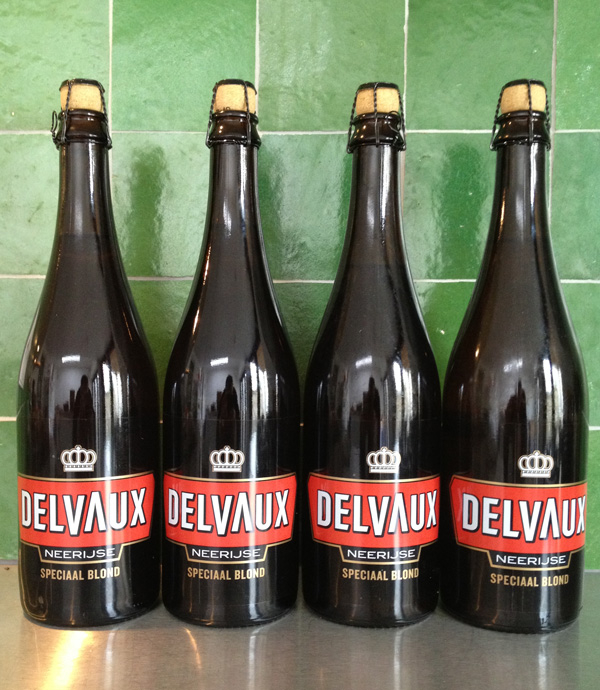Flanders Beer Trail 4: professor and his sons restore a Belgian Crowning glory
Added: Sunday, July 28th 2013
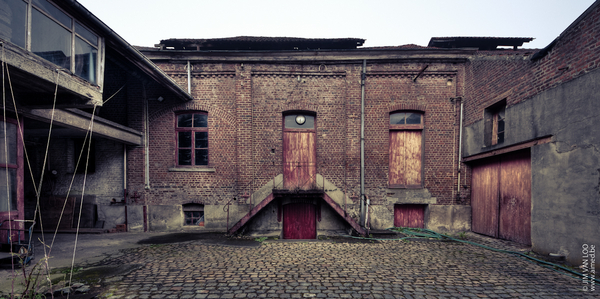
The Delvaux family and their De Kroon brewery are living proof of the old saying that small is beautiful. They make tiny amounts of beer, which is only available on draught in the restaurant alongside the brewery. Yet they are a powerful force in Belgian brewing, providing a unique service for other brewers.
De Kroon is based in the village of Neerijse, half an hour from Leuven. The original brewery (pictured above) operated from 1897 to 1998 and its perfectly preserved buildings now form a national heritage centre. Alongside there’s a small modern brewery that produces three regular beers, on sale in a spacious bar and restaurant.
The real power house of the complex is the Beer Centre Delvaux, where Professor Freddy Delvaux and his son Dr Filip Delvaux run a laboratory dedicated to yeast propagation and storage. They keep samples of yeast from other breweries in Belgium, analyse yeast DNA and develop new cultures for specific styles of beer.
Freddy Delvaux is hailed as the “flavour king” of Belgian brewing. What he doesn’t know about yeast, malt, hops and fermentation could be written on the back of a torn beer mat. He gained a PhD in biological science at Leuven University and went on to become head of the laboratory at the Artois brewery in the city. He worked at Artois – now part of AB InBev -- between 1973 and 1991 and then returned to the university to establish a malting and brewing faculty. (The university had had a similar department before, but this was lost in 1968 when the ancient centre of learning split between Dutch and French speakers and the brewing faculty moved to Wallonia.)
Freddy Delvaux’s new department gained world-wide recognition for its work. One of its graduates was Freddy’s son Filip and in 2010 father and son joined forces to turn the old De Kroon site into a museum, with their own laboratory next door. They have built a five hectolitre brewery, using German equipment built in Munich, where they not only brew their own beer but also produce trial brews for other companies.
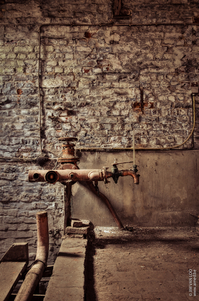
The third member of the family is Peter Delvaux, a lawyer who specialises in media and event management. He used his skills to turn the derelict De Kroon site in to a major visitor attraction. De Kroon – the Crown – produced a wide range of beers, including Blanche, Bock, Table Beer and a Dubbel Wit or strong white beer. One of its leading brands was called Pale-Ale and was inspired by the English style: it was reproduced so meticulously that, according to Professor Delvaux, the brewing water was “Burtonised” with salts to create the typical brewing liquor found in Burton-on-Trent. The Delvaux have the original recipe for Pale-Ale and have recreated it as Super Kroon, one of their house beers.
(Pictured above and below: the tap that fed the cool ship in the old brewery with old equipment below still on show)
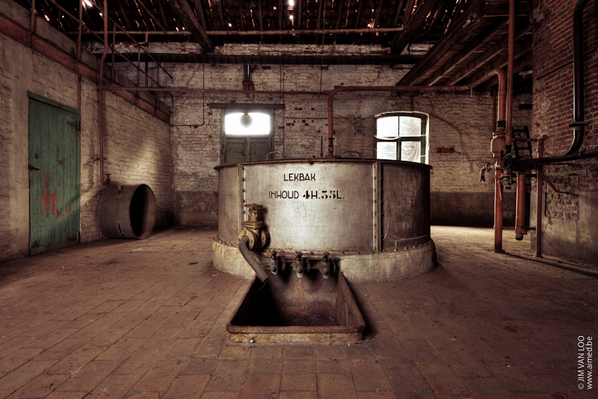
The original 60-hectolitre De Kroon brewing equipment has been lovingly restored and is housed in the three storey, red-brick site, with high raftered ceilings on the top floor. The kit includes a mash tun and filter, a copper that was fired by direct flame, a wort cooler and – intriguingly – a cool ship under the eaves. Cool ships are the signature vessels of lambic breweries – see the report on the Boon brewery in Flanders Beer Trail 2. It’s in the cool ship, a large open pan, that hopped wort is infected by wild yeast strains in the atmosphere, which enter the brewery through the partially open roof.
But, Professor Delvaux explains, De Kroon was not a lambic brewery. While the wort was inoculated with wild yeast, a cultured strain was added in the open fermenting vessels.
From the old to the new. Across the courtyard, the modern stainless steel equipment in the new brewhouse (below) is based on a mash mixer and filtration system, where the wort returns to the mash mixer for the boil with pelletised hops. There are four small conical fermenting vessels, two of which are used to test yeast strains: the vessels are filled with the same hopped wort but are then fermented with different strains. Following fermentation, beers are matured in tank: the entire production time for warm-fermented beers is four weeks.
As is the case with many old Belgian breweries, the De Kroon site – founded by the De Coster-Depré family – has the rustic air of a farm. The Delvauxs maintain the farming link by supplying spent grain and hops to local farmers while Hubert De Coster, a direct descendant of the founder of the brewery, still lives on the site.
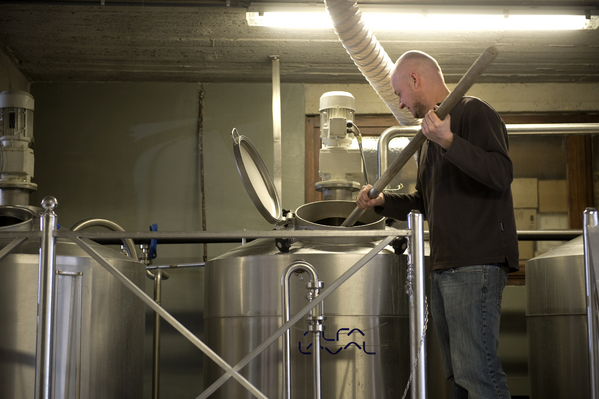
Professor Delvaux led the way up wooden stairs to the laboratory. This is the powerhouse and main source of income for the operation. In the spotless rooms, packed with scientific equipment, lab technicians work on yeast cultures. Filip Delvaux says they have contracts with 21 Belgian breweries, including Achouffe, Anker, Augustijn, Boon, Karmeliet, Rodenbach, Roman,Tongerloo and Westmalle. The role of the brewery centre is to analyse faults in beer, solve problems, test yeast DNA and develop new beers, brewed at first on site. Many other breweries deposit samples of their yeast at De Kroon. There are 600 cultures stored there and if a brewery encounters a yeast problem it can get a fresh sample from the lab.
The old De Kroon beer store now houses a spacious bar and restaurant. As well as meals, regular beer talks and tastings are staged there and the entire site is open for conducted tours. Many of the delicious dishes on the menu are cooked with the house beers: Super Kroon pale ale (6.5%), Job (6%) and Delvaux (8.5%). Super Kroon is brewed with pale and cara malts and is hopped with English, German Hallertau and Czech Saaz varieties. Some Brettanomyces yeast is added to other cultures to ferment the beer: “Brett” is one of the “wild yeasts” used in lambic production. The cloudy pale bronze beer has a slight hint of acidity on the nose with peppery hops. Caramel is evident on the palate from the darker malt and there are hints of ripe banana and spicy hop in the dry finish. Freddy Delvaux says his house yeast culture creates a lot of banana character.
Job is his nickname. It’s a somewhat convoluted Flemish joke, based on Frédéric Chopin or Chop for short, which becomes Job in the local dialect. The hazy blond beer is full of rich fruity esters – apple and banana -- with citrus and spicy notes from the hops. Delvaux is pale gold and has a big spicy hop aroma and palate, with honey malt in the mouth, spicy hop resins and tart fruit. The finish is bittersweet with honey malt, tart hops and tangy fruit. This beer is available in bottle and can be bought as a gift pack.
The De Kroon brewery is a living, breathing contribution to beer culture and should not be missed by all lovers of good beer and its history.
*De Kroon Brewery, 20 Beekstraat, 3040 Neerijse, Belgium. Phone: 32 16 43 94 72. www.brouwerijdekroon.be. Kitchen open 12-2.30; 5.30-9, 10 Sundays. Closed Mondays. Images, courtesy of De Kroon, are by Jim Van Loo and Marco Mertens; www.visitflanders.co.uk.
